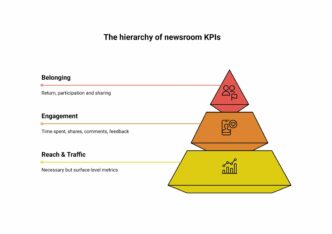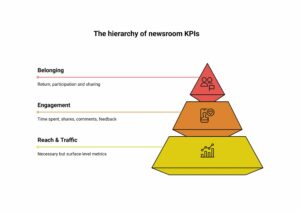

Marketing directors play a pivotal role in shaping the success of their organizations. They are tasked with making strategic decisions that can significantly influence their company’s market position, revenue growth and brand perception. While strategic decision-making is often associated with rationality and data-driven analysis, we have realized that emotions can impact these decisions more than we think.
Marion and I arrived at that conclusion during a team-building session while debating why our clients’ sensibility tended to influence their audience conversion strategies. We noticed that many of them were willing to change customer journeys or even the entire gated content strategy from one day to the next. After our conversation, we decided to delve into the profound influence of emotions on strategic decision-making, with a specific focus on marketing directors in the media business.
Emotions and decision-making
Contrary to popular belief, decision-making is not purely rational and devoid of emotions. Emotions serve as a crucial driving force behind our choices, particularly when faced with complex and ambiguous situations. For marketing directors, understanding the emotional aspects of decision-making can unlock valuable insights and enhance the effectiveness of their strategic initiatives.
💡 Whether it’s fear, nostalgia, frustration, or even excitement or curiosity, emotions can significantly influence our business’ decisions.
Frustration for instance tends to lead to impulsive decisions. I remember speaking to the Director of a small media outlet specialized in Health & Nutrition. His anger over the decline in ad-revenue following the recent compliance policies in France led him to check what his competitors were doing. In his frustration, he decided to launch a subscription offer without proper planning or market research. His new subscription strategy succeeded initially, but he lacked sustainability and failed to retain new subscribers over time.
Emotional Bias and Decision Pitfalls
While emotions can be a powerful tool, they can also introduce biases that impact decision-making. Marketing directors must be aware of emotional biases, such as confirmation bias (favoring information that supports preconceived notions) or loss aversion (avoiding risks to protect against potential losses).
- Confirmation bias
Despite data showing a decline in programmatic ad-revenue, the Marketing Director of a regional newspaper in Belgium strongly believed that advertising was the only way to succeed. To validate his preconceived notions, he selectively seeked out positive success stories and testimonials from competitors that were still relying on a 100% ad-revenue model. He conveniently ignored any data or research that suggested a shift in reader behavior towards registration and subscription models. Additionally, he dismissed feedback from his marketing team about the diminishing returns on ad campaigns. As a result, the Marketing Director allocated a significant portion of the marketing budget to real-time-bidding advertising, even though the returns were not as substantial as before.
- Loss aversion
Emma, the Marketing Director of The Mousteyton Post*, was facing the challenge of better qualifying their audience (almost 40% of The Mousteyton Post readers were anonymous). The data showed that putting in place a registration wall will help her get a better sense of their audience interests. However, Emma was apprehensive about shifting her audience conversion strategy and did not want to change her hard paywall strategy. She feared that by putting in place a regwall, she would lose potential subscribers.
Instead of embracing the risk and potential rewards of a membership strategy, Emma opts for a conservative approach and decides to stay still. Her aversion to taking calculated risks hindered the Mousteyton Post’s ability to capture a relevant audience data, and competitors gained an edge by not only capturing this data but putting it to use to convert subscribers thanks to their soft paywall strategies.
* Fictional names.
💡By recognizing these biases, marketing directors can implement checks to ensure strategic decisions are based on a balanced evaluation of both emotions and rational analysis.
Strategies for Emotionally-Informed Decision-making:
Data-Driven Insights with Emotional Context:
Marketing directors should combine data-driven insights with emotional context to inform their strategic decisions. Analyzing reader behavior, conversion rate, and engagement metrics can provide valuable emotional cues, helping to shape marketing campaigns that resonate with the target audience. By integrating emotional intelligence into data analysis, marketing directors can uncover new opportunities and optimize their decision-making processes.
Test Emotional Appeal:
Incorporating emotional appeal into marketing strategies requires experimentation and testing. Marketing directors can run A/B tests to gauge the impact of different emotional triggers on their target audience. By evaluating the emotional responses and subsequent conversions, marketing directors can fine-tune their campaigns, ensuring their decision-making process is refined and optimized for maximum effectiveness.
The fashion magazine ELLE serves as a great example of a successful A/B testing approach. One of the ongoing challenges faced by the magazine’s marketing team is increasing the Click-Through Rate (CTR) on their paywall Subscribe button. Instead of making decisions based on emotions or feelings, they adopt a data-driven approach by continuously modifying the paywall design and messaging. This allows them to gather valuable information about what effectively converts their users into subscribers. For instance, through their A/B testing, they discovered that foregrounding the price worked better than highlighting the advantages of the subscription when encouraging users to subscribe.
The takeaway
Emotions play a significant role in strategic decision-making for marketing directors in all industries. By harnessing the power of emotions, marketing directors can create impactful campaigns, connect with their audience on a deeper level, and achieve better business results.












